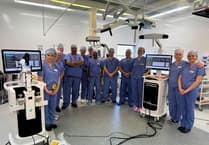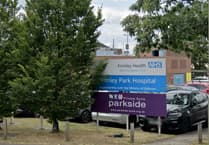RENEWED concern was voiced about the relocation of emergency stroke care from Guildford to Frimley, after South East Coast Ambulance Service (SECAmb) was judged “inadequate” for the second time running.
Haslemere Health Group chairman Ian Doolittle said: “This is not just worrying news, it is frustrating too.
“The improvement in SECAmb’s performance was key to the decision to take the risk on Frimley, rather than Guildford.
“Residents will be asking the Guildford and Waverley Clinical Commissioning Group (GWCCG) and also Jeremy Hunt why the decision was taken – and why now it shouldn’t be reversed. Why let patients’ health depend on a failing service?”
Mr Hunt, the Health Secretary, who is also the town’s Tory MP, pledged in May he would improve failing SECAmb’s response times, amid mounting concerns it would not get emergency stroke victims from Haslemere and the surrounding area, to Frimley Park Hospital within the critical first two hours.
Mr Hunt held a series of stroke ‘summits’, attended by SECAmb chief executive Daren Mochrie, to check its ability to provide a “fit for purpose service” before the decision on relocating emergency stroke care was made, after expressing concern at repeated reports ambulance response times in Haslemere were “too slow”.
Objectors remained doubtful SECAmb would be able to improve its response times when the local CCG and North West Surrey CCG agreed in September the nearest of two new 24/7 hyper acute stroke units would be based at Frimley – not Guildford.
Responding to concerns about response times, the CCGs said they recognised SECAmb’s commitment “to support delivery of the model of care”, which was described as believing an “empty promise” by objectors.
Following the CCGs announcement Mr Hunt said the clinical evidence was “overwhelming” that concentrating initial stroke care in a smaller number of hyper acute units saved lives, so he was confident Frimley would deliver the “best possible outcomes”.
But he added: “There are still issues to be resolved about ambulance response times in Haslemere and I will continue to press SECAmb to make the improvements we all know are urgently needed.”
This week, responding to the CQC’s ‘inadequate’ verdict, Mr Hunt said: “It is very disappointing SECAmb will remain in special measures and has not made the improvements they were aiming for.
“The CQC report recognises progress has been made since their previous inspection in May 2016, but this has not been as fast as would have been wished.
“I am assured by SECAmb’s Daren Mochrie they are working hard to improve this performance.
“I will be meeting him again at the beginning of next month when I would expect to get an update and discuss the steps they are taking to further improve.”
CQC chief inspector of hospitals Professor Edward Baker judged SECAmb services were “inadequate” overall after rating its safety and leadership inadequate.
The trust’s effectiveness and responsiveness required improvement but it was rated ‘good’ for caring.
Professor Baker said: “The trust failed to achieve national performance targets for the highest priority calls.
“While this was similar to other ambulance trusts nationally, patients were put at risk through delays in treatment or taking them to hospital. The outcome data was worse than the national average for the majority of clinical outcomes measured.”
He said the voice-recording system had failed to consistently record all 999 calls since January, which meant the trust failed to keep complete records for all patients to ensure safe care. It found SECAmb’s response to ‘red one’ life-threatening 999 calls had deteriorated from 71.6 per cent to 67 per cent, against a national target of 75 per cent within eight minutes, since its inspection a year earlier, and less urgent calls including strokes and fits had deteriorated from 67.3 per cent to 50 per cent.
The trust said this week that under the leadership of its new chairman and chief executive, who both joined in April, it had been updating its improvement plan to help ensure all the shortcomings are rectified.
Mr Mochrie said: “While I am disappointed not enough progress has been made for us to improve our overall rating, I am confident progress is being made and this will continue. I believe the pace of improvement has picked up since the CQC visit in May 2017 but I am very aware, as is our senior team, there remains a significant amount of work to be done.
“Our updated improvement plan focuses on the areas where we are determined to make major improvements in the months ahead. We are working with our local commissioners to ensure we are funded appropriately and have the right resources to meet the demand we are facing.
“Right across the trust, staff are working flat out to ensure the necessary improvements continue to be made and I am pleased staff told inspectors they feel more positive about the organisation and we are heading in the right direction.
“There are some positives to build on. In recent months we have successfully delivered a number of key projects, including moving to our new emergency operations centre and HQ at Crawley and introducing a new computer-aided dispatch system.
“The success of projects such as these will ensure we are providing the right foundation for a better service in the future.”
Trust chairman Richard Foster said: “The board acknowledges not enough progress had been made since the last CQC inspection in May 2016.”
He said SECamb’s new leadership team was committed to delivering the “vigorous improvement programme” under way.




Comments
This article has no comments yet. Be the first to leave a comment.